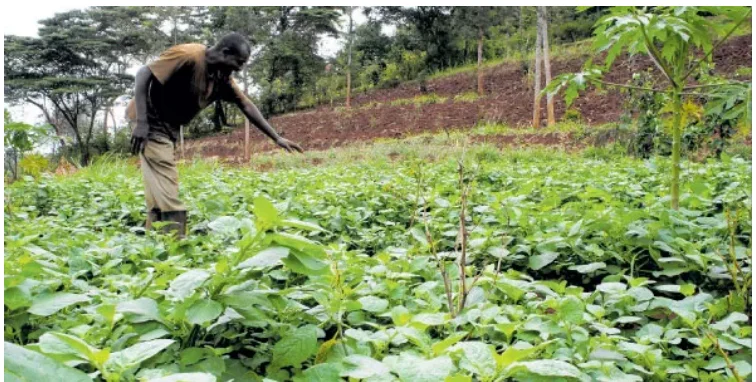If you want to persuade Henry Kinuthia to leave his thriving African nightshade farming business—commonly known as managu—be prepared to offer him nothing less than a million shillings per month.
“Anything less,” he says, “you can keep to yourself because I am perfectly content with my current occupation.”
African nightshade, a leafy vegetable available in various varieties, is renowned for its medicinal properties, driving a consistent year-round demand. This market euphoria has made it a lucrative venture for farmers like Mr. Kinuthia.
Sharing his success story, Mr. Kinuthia reveals that a modest 40 by 100-foot plot dedicated to managu farming can generate an impressive Sh. 36,000 per month.
“I am currently in my fourth year specializing in managu farming on a full acre,” he explains. “This means I rake in Sh. 144,000 monthly.”
Farming wasn’t always part of his aspirations while growing up. Like many young people, his dreams were centered on carving out a professional career. After completing secondary school, he pursued a course in electrical mechanics, graduating with high hopes of securing stable employment.
However, by 2011, the harsh reality set in. “I could only find casual jobs,” he recalls. “No one was willing to offer me a permanent position. It was a challenging period, and out of frustration, I ended up working at Wakulima Market in Nairobi as a porter, hauling 120-kilogram sacks of potatoes from lorries.”
On a good day, he could offload about 2,400 kilograms and earn Sh. 400.
“That translated to Sh. 2,000 weekly or Sh. 8,000 monthly,” he recounts. “But my monthly expenses were Sh. 12,000. I was living hand-to-mouth, often borrowing to make ends meet. It was a torturous existence for both my body and soul.”
In 2012, Mr. Kinuthia decided to return to his Kamungu village in Murang’a County and try his hand at small-scale farming.
“My time at Wakulima Market made me realize that managu was a fast-selling vegetable,” he says. “I ventured into its farming, and since then, I have lived comfortably. I might be working in the dirt and mud, but my earnings rival those in the upper-middle-income bracket.”
Managu Farming: A Path to Prosperity
On his 40 by 100-foot plot, Mr. Kinuthia harvests approximately 300 kilograms of managu weekly.
“At a farm gate price of Sh. 30 per kilogram, that translates to Sh. 9,000 weekly,” he explains. “For an acre, I earn Sh. 36,000 weekly, which adds up to Sh. 144,000 monthly. With a crop lifespan of three months, I make Sh. 432,000 per cycle.”
By 2019, he had expanded his farm to four acres, earning an impressive Sh. 1.73 million that year.
“That’s why I’m adamant: if you want me to leave this farming business, pay me Sh. 1 million per month,” he asserts. “In my current occupation, I don’t pay rent or transport costs, and I eat fresh produce straight from my farm. Rural life may lack the glamour of the city, but the financial rewards brighten my spirit.”
Low Costs, High Returns
Mr. Kinuthia emphasizes that managu farming is cost-effective.
“An acre requires only Sh. 2,000 for fertilizer,” he says. “The crop matures within three weeks and is ready for the market. Maintenance is minimal, involving weekly irrigation. Managu is a hardy plant that thrives even in sunny conditions.”
During rainy seasons, while prices may drop to Sh. 10 per kilogram, productivity increases to 600 kilograms weekly from a 40 by 100-foot plot.
Advice to the Youth
“Wealth creation starts with crucial decisions,” he advises. “You can either cling to a low-paying job or break free and focus on ventures with good returns. Hard work and strategic choices are the keys to financial independence.”
He also underscores the importance of family life. “If you’re a man aged 25 to 35 and unmarried, you’re missing out,” he says. “There’s no greater joy than working hard, earning an honest living, and returning home to your family.”
A father of four children aged between 4 and 16, Mr. Kinuthia finds purpose in his farming enterprise.
“My family gives meaning to my work,” he concludes, “and my success in managu farming is proof that opportunities abound for those willing to seize them.”



